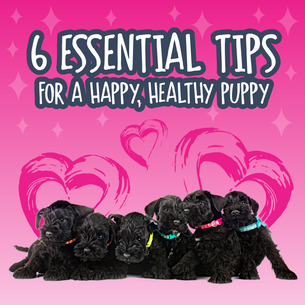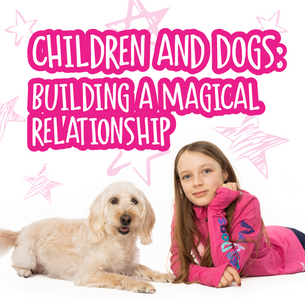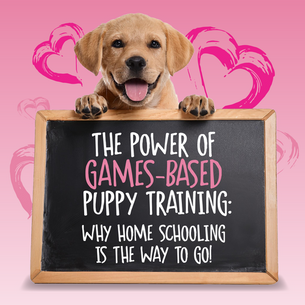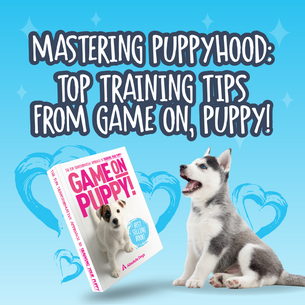Yikes! Has your wonderful, focused puppy apparently forgotten you exist or that you’ve taught them anything?! Has their behaviour suddenly become a whole lot worse?
As your puppy grows and matures, you may find that the adorable, goofy little bundle of energy you brought home is no longer the same. Somewhere around 6-7 months of age, your puppy begins to transition into adolescence, a period that can last until they are 2 years old (or even 3 years for larger breeds). This phase brings a unique set of challenges as hormones surge and their brain undergoes significant changes.
All of a sudden, you have a teenager in the house!
Here’s what you need to know to understand WHY your puppy might struggle through their adolescent period, provide the support they need, set them up for lifelong success and emerge on the other side with a stronger relationship than ever.
What Happens During Canine Adolescence?
Adolescence in dogs is akin to human teenage years. During this time, puppies often experience a reduced attachment to their owners and show increased interest in the world around them. This shift isn’t due to disobedience or stubbornness. It’s a natural, evolutionary phase where they begin to test boundaries and explore their independence.
You may notice behaviours that were once reliable start to falter. Simple cues like recall might be ignored, and new, frustrating habits can emerge. This is all part of your puppy’s brain maturing, and your role during this period is to provide patience, guidance, and understanding. While it can be tempting to feel frustrated, now is the time to shift your focus to building your relationship through games and positive interactions.
Challenges You Might Face
Adolescence often comes with what we call “blips” - temporary behavioural changes that can feel like setbacks. These might include:
- Difficulty disengaging: Your puppy may become more easily distracted, whether it’s by other dogs, squirrels, or even an interesting smell. Address this by playing games that promote disengagement, teaching your dog the value of “that’s none of my business”.
- Heightened emotional responses: They may suddenly become fearful or overly excited about things they previously ignored.
- Boundary testing: Behaviours like counter-surfing, barking, or pulling on the lead might appear or intensify.
It’s really important to remember that these behaviours stem from the changes happening in their brain and body, not from defiance. By focusing on relationship-building and management, you can help your dog navigate these blips successfully.
Building a Strong Relationship
The most important thing you can do during adolescence is to prioritise your relationship with your dog. This is not the time to introduce a host of new skills or put excessive pressure on training. Instead:
- Play games: Games that focus on key concepts like disengagement and optimism can help your dog develop the skills they need to navigate their world confidently.
- Make deposits in your relationship bank account: Provide plenty of positive interactions and avoid punishments that could harm your relationship.
- Focus on non-event training: Teach your dog that distractions are “none of their business” by calmly rewarding them for staying focused on you.
Get your training game on with Game On, Puppy! and discover fun, easy-to-play games designed to teach those powerful skills and concepts that will set your puppy up for the very best success, through puppyhood, adolescence and beyond!
Key Concepts to Develop
Rather than focusing on teaching specific behaviours, this is a time to concentrate on those key concepts that are going to set you and your dog up for success, both now and as they continue to mature into adulthood.
Disengagement
Help your dog learn the value of moving away from distractions, whether they’re exciting or intimidating.
- Ultimately, disengagement will help your dog have:
- Off leash freedom
- Awesome recall
- The ability to make great choices in all situations
- The ability to work around distractions
- Appropriate greetings with other dogs
- Great focus on you
- An understanding that certain things are “none of their business”
Build it now, and it will not only help ease the struggles of adolescence – it will set your dog up for life!
Optimism
This is a period where you really want to guard and protect your dog’s optimism.
Sometimes this can mean taking a step back. What was easy for your puppy just weeks ago may be something they’re struggling with now.
Focus on growing their optimism through games that empower them and give them easy, easy wins.
If you’re new to games-based concept training, our free Optimism Rocks eBook is a great place to start.
Non-Event Training
Non-event training becomes particularly important during your dog’s adolescence.
What do we mean by non-event training?
Quite simply, you want your dog to learn that most of the time, things are none of their business - and to be cool with that!
By calmly rewarding your dog for remaining composed when distractions arise, you reinforce the idea that these events are unimportant.
If your dog finds it challenging to stay focused, consider increasing the distance between them and the distraction to make the situation easier for them to handle. Alternatively, you might choose a less stimulating environment for your next outing.
Treat any setbacks as opportunities to explore new strategies or play engaging games that encourage your dog’s growth and resilience.
This is a brilliant time to get stuck into our Sexier Than A Squirrel Dog Training Challenge, learn games and strategies that will really power up your dog’s focus and inject some relationship-boosting fun into your training sessions.
Managing Expectations and Environments
It’s tempting to expect your dog to behave as they did during their well-trained puppy days, but adolescence requires a reset. Take back some responsibilities by:
- Using Management Tools: Reintroduce crates, leads and puppy gates to prevent undesirable behaviours.
- Avoiding Overexposure: Limit your dog’s exposure to overwhelming situations.
Don’t feel bad about putting your puppy back on lead. You are setting them up for much greater success and freedom in the long run.
Make a point during this period of actively avoiding putting your puppy into situations they don’t need to be in. Your puppy won’t forget all the skills you have worked so hard to grow if they don’t practice them for a while – but they could rehearse many undesirable choices and behaviours if left to their own devices.
Your puppy won’t suddenly forget how to interact appropriately with other dogs if they don’t have the opportunity to meet other dogs for a while. This is hardwired into every dog. However that sudden inability to disengage, alongside those blips we discussed above, could mean your puppy suddenly finds themselves having less positive interactions with other dogs, as the skills and concepts they need to have those appropriate conversations with other dogs (disengagement and optimism) have suddenly taken a massive dip.
Being mindful of what you expose your puppy to during this period is so important.
Remember, it’s okay to step back and make things easier for your dog during this phase. Supporting them through this developmental period is far more important than maintaining perfection.
Check out our podcast episode Mastering the Magic of Management in Dog Training for more great tips!
Reward Experiences Tailored to Your Dog
During adolescence, your dog may find the world far more enticing than before. To compete with these distractions, make sure your rewards, and the experiences you are providing, are fun and engaging.
By observing your puppy and how they naturally choose to interact with the world, you can tailor your reward experiences to compete WELL against what the world has to offer – and be at the centre of those experiences!
Perhaps your adolescent puppy has suddenly found great value in chasing off after other dogs or wildlife. As well as employing all your management strategies to ensure they don’t get to rehearse those inappropriate choices, you can build that rewarding experience into your games. How would that look? When your puppy checks in with you while you’re out and about, reward them by initiating a game where they get to hunt you down! Instead of chasing rabbits or squirrels, they get to chase you! Not only does that reinforce your value and reward your puppy in a way that lights them up with joy, you have fun together and boost that all important relationship bank account!
It doesn’t take hours a day to accomplish this. It’s important that just as much as you don’t put a lot of pressure on your puppy during this phase, you don’t put a lot of pressure on yourself either. Sometimes, the best thing you can do is just breathe and have fun. If it doesn’t feel fun, it may not be the right thing at that moment.
That means tweaking the training games you play to feel fun and successful, while still addressing the concepts your puppy needs most.
Purpose Before Exercise
During this period of adolescence, where conflict is more likely and those perfect puppy behaviours can feel like they’ve all but vanished, whatever you do with your puppy, remind yourself of your goal.
This isn’t the time to worry about whether your dog is playing a game exactly like it ‘should’ be played, or like they used to play it before their brain was taken over by adolescent hormones! Focus on finding ways to grow those core concepts that you know are going to serve your puppy well during this period and beyond. Finesse can come later.
It’s also really important to make sure that your wins don’t become expectations. Training is never linear and this is no truer than during adolescence. If you expect your puppy to do something one day just because they did it the previous day, you will quickly find yourself in that realm of conflict. This is a key moment to ask yourself what you want to achieve from a session, and adjust your plan to help your puppy succeed.
You’ve Got This!
Adolescence can be a challenging time, but it’s also an opportunity to deepen your connection with your dog. With patience, creativity, and a focus on relationship-building, you can help your dog thrive during this period and emerge as a well-adjusted adult - so you both come out the other side as a stronger team.
Remember, you are the best owner for your dog, and the effort you put in now will lead to a lifetime of adventures together!




